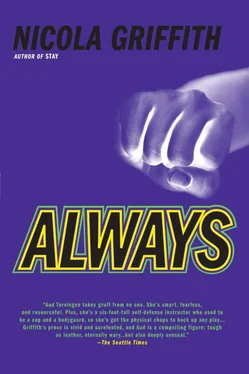She slid her warm, small hand into mine. I felt that familiar electric flood, saw the answering looseness in her shoulders, the way she nearly tipped back her head.
“See?” I held her hand very gently. “Not everything has changed. There is still this.”
She folded onto the floor and began to cry.
I held her with one arm, and stroked her hair, her shoulder blades, her arms, her hair again, kissed the top of her head, kissed her ear. Held her, held her, held her.
After a minute, she lifted her face. “Do you really want tea?”
“No.”
“Good.” She rested her cheek against my chest. After another minute I slid down to be next to her on the floor.
“Tell me what you need.”
“I need to do this by myself.”
“All right.”
“I mean it. Don’t meddle. Don’t push me. On anything.”
“What will you do first?”
“I have to tell my parents.”
“When?”
“Tonight.”
“Will you want to talk afterwards?” Surely it was all right to say that?
“I don’t know. They’re in Anacortes. I might stay over. I’ll call you tomorrow. Or you’ll see me.”
IT WASafter six o’clock and the park by Elliott Bay was empty of tourists. The air was salty enough to lick. My mother and I walked over the undulating grass and I told her about the grass that grew in the pocket park near my warehouse, about how I’d told Kick I was sorry, about going up in a plane, about taking Corning to see Leptke and how easy it had been to get Corning to talk.
“Once she started, she fell in love with the story of her own cleverness. I left them cooking up a way for Leptke to be able to name her as a source. They’re going to go talk to the DA about immunity from prosecution in exchange for full cooperation on council staff corruption.” Eight hours ago. It seemed like a decade, something dimly remembered and unimportant. But it was important. She had ruined Kick’s new career before it got properly started.
We walked on a path for a while.
“And did your—did Kick talk to the reporter?”
“I don’t think it’s top of her list at the moment.” Plus, she didn’t know about it.
In the distance, out of sight, someone began playing a flamenco guitar. “You don’t sound very happy.”
“Corning will lose her condo, and her license, yes, and you might argue that her hundred thousand is already making a difference to the people she hurt most, that it will help them pay their bills, help them keep their jobs, allow for the possibility of success, but, Mor, it’s just money.”
“And money isn’t justice.”
“No.” Dancing and vomiting in Pioneer Square. Bellowing about earthquakes in Nordstrom. The graphite sheen under Kick’s eyes and the molecules chewing at her spine. Stress was the worst thing for MS. Corning had contributed directly to that.
We walked on. The guitar player came into view: an elderly woman. I dropped ten dollars in her guitar case.
“You seem to have stopped losing weight, at least.”
“Yes. I’ve found—Kick showed me some things I could eat.”
“Kick. Will she have dinner with us?”
“It’s not her top priority at the moment.”
“I see.”
I doubted it. “She’s sick.”
“We can postpone, until…” Her step faltered, as though she had tripped over an invisible crack in the pavement. “Ah, I see. Is it very bad?”
“It’s multiple sclerosis.”
“I’m so very sorry.”
“She hasn’t died.”
“No.”
“And she won’t die. No, Mor, listen. Please. MS isn’t like that.” And I poured out the conflicting opinions and research I’d read on the Web, and what Kick’s doctor had said. She listened without comment.
When I’d finished, she said, “And she is well currently?”
“She gets a little tired. And when it’s hot she sometimes limps a little, but not always. But she looks… You can’t tell. She’s strong.” Very strong. “She only found out today. She is…” I wasn’t sure how to describe her offhand cheeriness, followed by her weeping. “She’s in shock, I think. As you can imagine.”
“Yes.”
“I wanted to be with her tonight but she’s with her family. Telling them.” Right now. Explaining, probably, how she wasn’t going to die. Or probably wasn’t.
“What will you do?”
“I don’t know.”
We followed the path to the water’s concrete-bound edge. “The light is extraordinary, don’t you think?” she said.
It was. To the west, the view could have been one from a north European coast, all heather tones: a deep blue sound with hints of slate in the shadows between waves, lacy whitecaps, low islands in the distance, their outlines softened by the low clouds, which were layered, moving in two distinct directions, the way I imagined two armies might, streaming past each other, heedless, in an effort to regroup. I was reminded of the Western Roman emperors: blank-eyed, massive, calm, carved to inhuman size from white marble. The view east from Kick’s window would be more like that of the exotic Eastern Empire: crimson, rose gold, molten brass, the air twinkling with dust rising from the drying dirt, burning to umber. The clouds, too, would be different, gauzy and light, like a bundle of harem silks sliced through with a cheese wire and draped over Queen Anne where the windows would be glinting like the gilded dome and minarets of Hagia Sophia.
Hadrian had built his wall at the westernmost tip of his empire, and turned his face inward, and the Roman Empire had begun to die. In the east, Justinian, at Theodora’s urging, had faced his enemies, kept expanding. The Roman Empire of the west had merged imperceptibly into the barbarism of the Germanic tribes in the fifth century. Byzantium had continued until the Turks crushed it in the fifteenth.
“…glad,” my mother was saying. “Atlanta must be very beautiful for you to want to leave this place.”
LESSON 13
THEY ALL STARED SILENTLY AT THE MATTRESS PROPPED AGAINST THE FAR WALL.It was a brand-new double which I planned to donate to Arkady House when the classes were over.
“Here is a handout covering some of the topics we’ve talked about in the last couple of weeks, and one or two other things that might prove useful.” It was a retread of my previous list, grouped into related headings: information you should never hand out to a stranger, ways to protect yourself at home, and so on. At the top, in big, bold font were phone numbers of Bette’s new associate, who would be eager to represent any of them in an emergency, Arkady House, the Georgia Domestic Violence Coalition, emergency hotline numbers, and the phone numbers of three hospital emergency rooms. Perhaps these numbers would displace mine in their minds and speed-dials. I’d also copied from a website a checklist of items one should assemble before leaving a violent domestic partner: passport, birth certificate, checkbook, medical records, children’s records, etc.
Most of them flipped through the sheaf with one eye on the mattress. Sandra ignored the mattress completely and examined the checklist one item at a time. I studied her. She seemed to have gained weight.
“Put the lists away now.” They all turned to their various bags and back-packs and Tonya flinched as Suze swung her bag quickly from the bench about a foot from Tonya’s head.
The nose looked fine to me, but clearly she was gun-shy. They all were. Time to discuss the elephant in the living room.
“Tonya, how’s your nose?”
“Okay. I guess.”
“It looks good, no swelling. Does it hurt?”
“Not especially.”
“Any problems with breathing? Odd nerve sensation?”
Читать дальше












